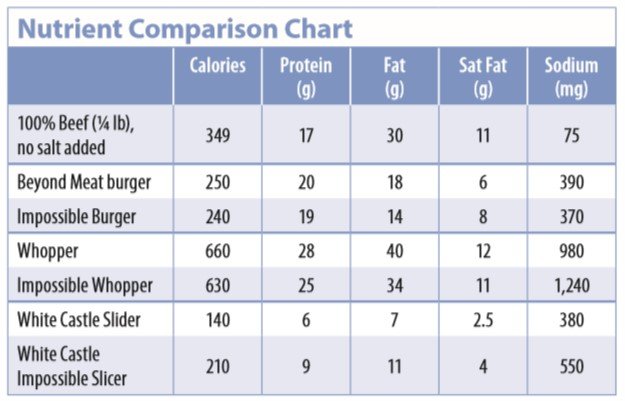Sales of meat alternatives grew 30 percent in 2018, and this rapid growth is expected to continue. In 2019, plant-based meat alternatives hit the mainstream, with the nationwide introduction of meatless “meat” at multiple fast-food outlets (including Burger King, White Castle, DelTaco, and some McDonald’s locations.)
Making “Meat” from Plants: Until recently, the growing meat-alternative market was made up of patties, crumbles, nuggets, and other products made from textured vegetable protein or formed from beans, grains, mushrooms, and/or other vegetables. Now, a new kind of meat alternative has entered this growing market: plant-based “meat” that looks and tastes very much like, well… meat. “These products, like the Impossible Burger from Impossible Foods and Beyond Meat’s burgers and sausages, are designed to replicate the taste, texture, and chemical composition of meat,” says Nicole Negowetti, JD, a clinical instructor at the Harvard Animal Law and Policy Clinic.
Meat (be it from a cow, pig, chicken, or other animal) is muscle, and muscle is essentially protein with some fat, connective tissue and blood vessels running through it. Alternative-meat manufacturers extract proteins and fats from plants and mix them together in percentages that match those of animal meat. That gives the product cooking properties, texture, and mouth feel similar to meat. The proteins are typically isolated from legumes like peas or soybeans. The fats in these products are plant oils (which are simply fats extracted from plants). Manufacturers
have devised various processes for adding the color and “meatiness” that blood brings to meat: Beyond Meat, for example, uses pomegranate powder and beet juice; Impossible Foods has found a way to “grow” heme iron in soy plants to replicate the hemoglobin and iron in blood. These plant-based “meat” products are derived from plants, but they are highly processed foods that bear no resemblance to the plant foods from which they come. “They have been engineered to mimic the macro and micronutrient composition of meat, while including highly processed and novel components,” says Nicole Blackstone, PhD, assistant professor in the Friedman School’s Division of Agriculture, Food and Environment.
Human Health: “We don’t know anything about the health effects of these novel meat replacements yet,” says Blackstone. We do know that diets high in red and processed meats are associated with higher risk of developing obesity, type 2 diabetes, cardiovascular disease, and some cancers. “Diets lower in red and processed meat and higher in nuts, legumes, and other plant foods are associated with lower risk of cardiometabolic diseases,” says Alice H. Lichtenstein, DSc, a professor at the Friedman School and executive editor of Tufts Health & Nutrition Letter, “but these meat alternatives are not whole plant foods. They have lots of added components, so we can’t directly apply studies the evaluated the effect of plant intake to these highly processed foods.”
Compared to a beef hamburger, the meat-mimicking burgers tend to be similar in calories and protein and lower in total and saturated fat, although how the burger is served will affect totals. It should be noted that many meat alternatives are higher in blood-pressure-raising sodium than meat, but this depends on how the meat is prepared and the serving size (see Nutrient Comparison Chart).

Manufactured meat alternatives have the potential to be designed to favor unsaturated fats, provide more essential amino acids, or be fortified with more of the vitamins and minerals the diets of non-meat-eaters may be short on, such as vitamin B12 and iron—but that is not necessarily the case. “We also need to think about what people are eating with these alternative burgers,” says Lichtenstein. “The refined-grain bun, side of fries, sugar-sweetened drink and sodium-rich condiments are not good choices no matter what the burger is made of.”
In some other areas of human health, meat alternatives do have clear benefits: Unlike meat, these products don’t carry the risk of food poisoning from the likes of E. coli or Salmonella, and they do not contribute to the super-bug-creating overuse of antibiotics the way factory farming of livestock does.
“I believe that a one-to-one comparison of the health impact of meat versus meat alternatives misses the point,” says Negowetti. “The key question is, can these products be a tool to help people decrease their intake of red meat? Global red meat consumption is still rising, and the factory farming of animals for meat is known to be devastating from an animal welfare and environmental sustainability perspective. I am calling for a broader interpretation of ‘healthy’ in this conversation to include planetary health.”

Image © Pongasn68 | Getty Images
Planetary Health: “From an environmental perspective, beef burger substitutes like the Beyond Meat burger and Impossible Burger have much lower environmental impacts compared to beef,” says Blackstone. “For example, they use 87 to 99 percent less water and a have 89 to 90 percent smaller carbon footprint compared to a beef burger.”
According to recent Nielsen data, 62 percent of consumers are willing to reduce meat consumption due to environmental concerns, and 43 percent say they would replace meat-based protein with plant-based protein. “Even for people who aren’t concerned about animal welfare, the environment, or health, these products could encourage a move away from meat,” says Negowetti. “People want delicious—and they want cheap. If manufacturers can create meat alternatives that meet those criteria, it seems likely people will buy them.” If they are not necessarily benefiting consumers’ health, at least they are benefiting the health of the planet. “I do believe meat alternatives have a role to play in improving the sustainability of the food system,” says Blackstone. “They are one of the tools in the toolbox we have to reduce the environmental impacts of diets.”
Faux Meat, Real Concerns? Consumers have raised several concerns regarding plant-based meat analog products. While plant-based products do not have the hormones that non-organic beef has, they may have pesticides used on non-organic plants. Residue from the pesticide glyphosate has been found in the Impossible Burger, but the manufacturer points out that the levels in one burger are 1,000 times lower than the most stringent maximum daily intake levels. Consumers who wish to avoid genetically modified organisms (GMOs) should be aware that the Impossible Burger is made with GMO soy (Beyond Meat products are soy-free). The “heme” used in Impossible Burgers (soy leghemoglobin) is also genetically engineered. Genes from the roots of a soy plant are inserted into yeast, which are fermented to create significant amounts of the “heme” for use in the burgers. The company has done extensive testing on this process, and the U.S. Food and Drug Administration agrees that it is safe. While the process may be safe, some scientists are concerned that higher intake of heme iron has been associated with higher body iron stores and elevated risk of developing type 2 diabetes and cardiovascular disease.
The Bottom Line: Minimally-modified plant foods are still the cheapest, healthiest, and most sustainable option. “From both an environmental and health perspective, it would likely be better for consumers to replace red meat with whole, plant-based protein foods like legumes,” says Blackstone. But that doesn’t mean meat mimics can’t have a place on the plate. “Meat alternative products are not intended to compete with broccoli,” says Negowetti, “they are intended to move people away from red meat. I absolutely think these products can be one tool to help reduce red meat consumption and the environmental impact of red meat production. If people ate tofu or black bean burgers instead of meat that would be fantastic for health and the planet, but many people really like meat. Rather than try to convince consumers that meat is not essential for every meal, perhaps we can change what ‘meat’ means.”
To benefit your health and the health of the planet, follow these tips for cutting back on meat intake:
-Replace animal products with whole plant proteins (especially nuts, legumes, and soy) some or all of the time.
-Swap burgers for minimally-processed plant alternatives (like black bean or veggie burgers) for the most health and environmental impact.
-Try plant based meat products if you don’t want to give up meat.





















